Understudies! How 'Spring Awakening' Changed the Business of Musical Theater
by Jaime Green
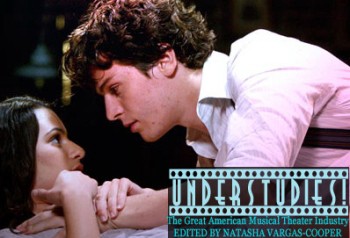
Spring Awakening was first produced off-Broadway at the Atlantic Theatre Company, an institution that has built its reputation on the in-your-face masculine hyperrealism of Mamet and Shepherd and McDonagh. It featured music by somewhat disappeared (but actually really good!) pop singer-songwriter Duncan Sheik, and words by playwright Stephen Sater.
The musical transferred to Broadway and was the runaway hit-also the critical and artistic darling-of the 2006 season. It is based on Wedekind’s expressionist play of the same (depending on the translator) name. In both tellings, sex is a mystery, a sin, and, eventually a killer. The fault lies not with the promiscuous youths, though, but rather the evils of a sexually repressive and socially rigid society. Wendela [spoiler alert] dies from a back-alley abortion not because she had premarital sex, but because none of the grownups in her life told her what could happen if she did. Moritz kills himself because he does not fit the narrow path that was proscribed for his life.
Christine Jones’ abstraction of a set colonized the entire theater with a flea market collage of old-timey paintings and objects-stern elders, idyllic seascapes, mirrors and artifacts. Lighting designer Kevin Adams bracketed tubes of primary color neon light to the walls of the space, shooting from the stage into the audience like a starburst. The stage was hemmed in on both sides by rows of audience seating, in the midst of which the actors sat between their scenes. There were also the songs sung rockstar style into handheld microphones.
Oh ho, you are saying. That sounds like some classic Brechtian alienation! Wherein the audience is reminded of the artificiality of the theater such that they can better analyze its lessons and ideas without the distractions of empathetic sentimentality! I am onto this!
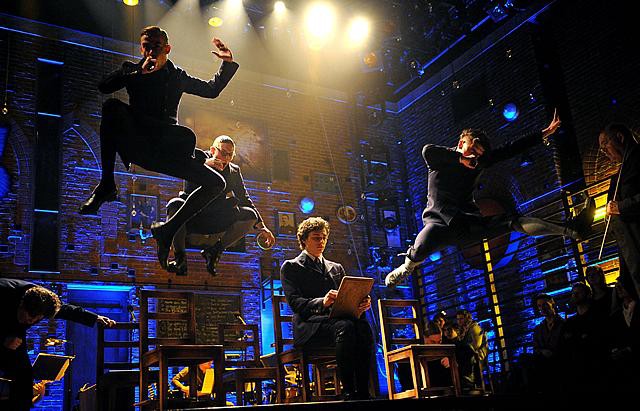
Not quite.
What that on-stage seating was doing, what the microphones were doing, what all of the un-realism of the production did, was support Spring Awakening’s most daring and subtle deviation from the glorious history of musical theater. They said, “Don’t worry. We’re not trying to be realistic. Or even a realistic world where people burst into song. See? There’s no realistic set. There’s an audience on stage. Don’t worry if things get a little weird.” If it was any sort of alienation effect at work, it was subliminal: signals that you could let your realism detector rest for a couple of hours. Because these fin de siècle German schoolkids were about to reach for their microphones and sing you some rock music about their feelings.
Theatre raises storytelling to a level of artificiality by performing it for an audience, by pretending. Musicals take that artificiality up a notch by introducing the bursting-into of song. Lyrics make song more artificial by rhyming, as natural speech rarely does. One could argue that brilliant lyricists like Stephen Sondheim make musicals more powerfully musical by further heightening the lyrical language-full of clever wordplays, metaphors, and rhymes, it acquires a greater distance from natural speech. It becomes less mundane, more artful. It becomes less a conduit for factual data, and more a conduit for emotion. The lyrics start to hold more meaning than they do as individual words.
Spring Awakening goes one step further: the musical sublimates its characters’ sung words into pure expressionism. Its songs exist in a timeless space of expression. (Even when they are not non-literal they are divorced from the literal scenes they live with in — characters sing about stereos, khakis, gym class.) And so the characters are singing an inner state rather than a scene. And so song no longer advances plot. The words become a conveyance for feeling. A melody’s individual notes don’t matter — an A or a C#, whatever. It’s how they make you feel, a transmission of meaning and emotion that transcends a codified language. The songs of Spring Awakening are the closest we have gotten to such transcendence in musical theater, at least on Broadway, at least in terms of something that didn’t violently crash and burn.
* * *
On the surface, Spring Awakening felt new and different because it was a sexy rock musical about attractive young people struggling under an oppressive society. It was dark and contemporary, with an edgy (for theater) almost steampunkily anachronistic aesthetic. The songs did not sound like musical theater. They were mournful and exuberant, and there was a rock cello in the band (provided by, I have since realized, the tour cellist of New Pornographers). It didn’t look like a regular musical, and it didn’t sound like a regular musical. There was cursing and fucking and probably the most poetic lyrics ever sung about jerking off.
The character singing about the existential dread of atheism is Melchior Gabor, whose rebelliousness verges on the anarchistic. Melchior’s best friend is Moritz, as terrified and alienated as Melchior is cocky and autodidactic. He is the one who sings, agonized, about wanting to jerk off, the beauty and magic and terror of it all. He later panics and flees when Melchior tries to help him by sharing what he’s ferreted out about the mechanics of sexual intercourse. There is also Wendela, who begs her mother to tell her how babies are actually made. The young women of Spring Awakening are full of the same angsty sexual frustration as their male counterparts, if a bit more dreamily so. Wendela and Melchior rekindle their lapsed childhood friendship under the new terms of impending adulthood. At the end of Act I they have sex in a hayloft (it’s worth noting that the musical turns the source play’s rape into an act of persuaded consent)
It is also worth noting that as Melchior climbs into the hayloft, what we see on stage is this: four ropes lower to the stage, which actors affix to the corners of a large square, in the middle of which Melchior stands. The ropes hoist this platform upwards as dozens of bare blue lightbulbs slowly descend from the space above the stage, so that Melchior rises into the lights.
It is one of the most beautiful and evocative moments of theater I’ve ever experienced. I don’t even think I knew it was about climbing into a hayloft. It was the translation of a feeling into stage magic-people and objects and light in real space-and into words. There is no switch, there is no angel, no one has blinds. But those boys sing those words, and you know what they mean.
To return to the plot and our doomed young people: Moritz runs away from home and from the unbearable pressure of unreachable academic success. One of the chorus girls sings about abuse and incest. One of the boys masturbates to a sexy postcard. And there is the business in the hayloft, as the chorus sings, over and over, in rising harmonies: “I believe, I believe, there is love in heaven. I believe, I believe, all will be forgiven.”
In Act II, Moritz kills himself; Melchior sings the saddest song ever about love and regret to (but not really to) Moritz’s silently weeping father . Two boys reprise Melchior and Wendela’s love theme. Wendela is pregnant. Melchior gets sent away. He (and the ensemble) sing a song called “Totally Fucked.” Wendela’s mother takes her for an abortion. You can guess how well that goes. Melchior runs away, back to home, to find Wendela’s fresh grave next to Moritz’s. Their two ghosts come and sing with him: “Those you’ve known and lost still walk behind you,” and he decides (break from the source material!) not to kill himself, but to keep them in his heart, etc. etc. The show ends with an abstract coda of hope, sung by the entire company, called “Song of Purple Summer.”
So no, there isn’t any tapdancing.
* * *
The legacy of the superficial newness of Spring Awakening-the sexy, emotive rock score; the stylish anachronism; the extra-theatrical composer-is already being felt. Green Day’s musical, American Idiot, shares Spring Awakening’s director, Michael Mayer, and one of its stars-John Gallagher, Jr., who was nominated for his inspiredly tortured star-making performance as Moritz.
There is also Bloody Bloody Andrew Jackson, transferring to Broadway from the Public Theater next year. It adopts Spring Awakening’s style from the cast of sexy young people and emo anachronism all the way down (or up) to the bars of neon light extending over the audience (which Kevin Adams wryly noted in his recent Tony Award acceptance speech, which was very awesome of him).
Whether and how Spring Awakening’s more subtle innovations in the musical form will be practiced and developed in future projects and by younger writers-this is yet to be seen, although there was not long ago a workshop of a play with original music of The Sorrows of Young Werther. (Spring Awakening was in development for seven years before it was produced, so we’re talking about a slower, longer timeframe.) Spring Awakening proved that a musical can work with non-narrative songs, and can work powerfully at that.
A pessimist could see this opening the door for a bunch of crappy jukebox musicals, but that door was long ago trampled down, and this is not about winding a plot around known commodity songs. What Spring Awakening will hopefully inspire is lyricists exploring how songs can function as more than-other than-sung scenes, but can open, as music does, tonal and intuitive windows into their characters’ hearts. Musical theater lyrics can function expressionistically, rather than always literally. You know, the way pop songs do. We lament musical theater’s estrangement from popular music, but if there is a chance for musical theater to grow as a form by singing in a pop idiom, it’s not just loud guitars. It’s this.
Spring Awakening can surely attribute at least some of its invigoration of a moribund form to the fact that while its book-writer and director were theater people, its composer and choreographer were not. Duncan Sheik kicked off a trend of indie-style songwriters trying their hand at the form-Colin Meloy, Stephin Merritt, and Regina Spektor are, or have been, repped by Sheik’s own agent and at work on various theater projects. I hope that more dance-world choreographers like Spring Awakening’s Bill T. Jones will bring their breaths of fresh air to the form as well. (Jones’ strange and abstract choreography was just as daring as Sater’s lyrics.)
I also cannot downplay the importance of a show succeeding by appealing to a young audience. Spring Awakening did. On the whole, theater’s audience is old and aging quickly. So much in New York caters to elderly ticket buyers, which inspires exactly as much innovation as you would imagine. If younger people are driving sales, then producers will have to be in touch with what younger people want, perhaps our only hope to break theater out of its dismal calcification.
But they probably said the same thing after Rent.
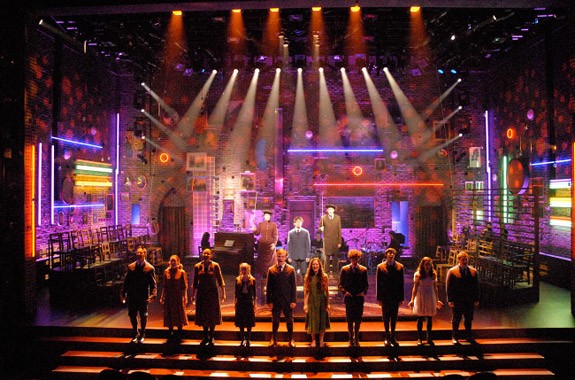
Jaime Green would also like to mention the dramaturgical elegance of Bat Boy: The Musical. She is not kidding.
Nation of Unemployed People Refuses To Boost Economy
Well this is a terrible surprise: something something recovery something something slowdown something something no one has a job.
Showed Up: Last Night's "Mega Secret Private" Robyn Show

Seth Colter Walls: Mary, thanks for inviting me to the “secret” Robyn concert in TriBeCa last night!
Mary HK Choi: Pshaw bro. It was absolutely my pleasure.
Seth: Don’t fucking bro me what to do!
Mary: Here bro. Drink this.
Seth: So it wasn’t actually that big of a secret was it? Was it a radio contest or something?
Mary: Yes it was. And that explained the crowd.
Seth: Oh really? Do you have bad things to say about radio listeners?
Mary: I don’t know why you’d pounce on “bad”…
Seth: I pounce on bad cuz I’m a shit-stirrer.
Mary: Well, yes, I did find some of the crowd’s sartorial/tonsorial decisions to be “confusing” but that’s not what struck me first. It was the fact that they were all standing in twos and threes in a space that was about the size of a studio apartment/studio-flex-Jr-1BR and they were all very well behaved.
Seth: Yes.
Mary: And that some of them had exotic accents that could be described as “Long Islandish.”
Seth: Yeah, the crowd was pretty peppy, for being in what looked kind of like an Ultimate Fighting Championship arena of the damned mixed with a tire warehouse lit by techno lasers.
Mary: I loved the lasers. We loved the lasers.
Seth: I blame the booze for my signing off on the lasers.
Mary: You were late so I went and stood near different clusters of hoi polloi before we retired to the VIP suite upstairs that had all that booze and it was interesting.
Seth: I was RIGHT ON TIME.
Mary: Well, you arrived when Robyn came on so: fair play. Let’s talk about Robyn.
Robyn Talk
Seth: Critical consensus seems to be correct about this individual.
Mary: Well, I love her but I did not used to love her. KABLOW.
Seth: I was *wincing* a little bit, though, on the first song (“Cry When You Get Older”), because the canned-backup Robyn vocals were hard to distinguish from the live-Robyn vocals.
Mary: Right.
Seth: I was thinking — hmm, this might not be a very dynamic live musical performance. But you know what?
Mary: You’re a snob?
Seth: …
Mary: What?
Seth: Starting with “Dancing on My Own,” somebody in her band decided to start digitally tweaking the backup-Robyn vocals. Which was really great and sounded *different* from the records!
Mary: YES. It was dope.
Seth: Right, cause then you could hear what Robyn was actually giving us live — which turned out to be some pretty expressive and tender singing for someone dancing that hard.
Mary: The band was great too because it was like Noah’s ark where there were two of each. Two drummers? Incredible.
Seth: But go back and explain why you didn’t used to love her. I want more than *kablow.*
Mary: I found her last album to be way gimmicky and too “Jeremy Scott” which for me is weird because I love gimmicks and Jeremy Scott (generally). But she rapped way too much in a corny euro fashion. AND I fucking hated her hair and the entire presentation.
Seth: So…
Mary: So I did not like the music. And I did not like the fashion.
Seth: That’ll do it!
Mary: Right but this go ‘round, I heart both. To where I almost don’t understand where all this newnew awesomeness is coming from.
Seth: Well, I think everyone agrees that Body Talk Pt. 1 is kind of a high point.
Mary: I am no music critic but it’s not that sort of thing where a number of green factors are coming to fruition, she honestly seems like a different person to me.
Seth: You are a social critic.
Mary: I YAM.
Seth: Explain what you loved.
Explaining the Love
Mary: I love that we can actually just… SEE HER. And she’s lovely. She’s so much more charismatic when she’s… distilled
Seth: The clothes. They’re kind of work-outy, no? Like, I’d go to BodyFlow with her but…
Mary: MAHAHAHHAHA! BodyFlow.
Seth: Right?
Mary: I found her outfit last night to be kinda hilarious because it was quite buttoned-up. I didn’t think it was as sportif.
Seth: You should see how the women in Beirut wear makeup to the gym.
Mary: That is up my alley.
Seth: Right.
Mary: Robyn was “body-con” in the sense that it was a tight fitting black mini dress with a square neckline and she had a sort of neu-Ann Taylor-ish necklace.
Seth: Is that … good or bad?
Mary: Good. But it did all make me feel like we were watching her do karaoke during happy hour where she “transitioned” into “nightwear” by removing a cashmere cardigan BUT it all totally works for me.
Seth: Yes. Also: damn that was a short set.
Mary: True! But… you know, back to the clothes for a second… when she turned around she had a big metal zipper running on the back of the whole thing which I loved.
Seth: YES! When she did the makeout with myself moves
Mary: SO AWESOME. I loved that.
Seth: It was also a hint of, Oh, she could also undress herself right now with that zipper.
Mary: There was that for sure. Also, the hint of metal was the point at which I had to see the shoes.
Seth: Oh, I wondered what motivated your exodus from the VIP section.
Mary: I SO got big aggy eyebrows from security when I bumrushed.
Seth: I SAW THAT. But you know what? You convinced him of your VIP-ness in like 2.3 seconds flat. I was impressed.
Mary: Well, duh. So I thought her voice was wonderful but you are a gigantic snob when it comes to live voices so what did you think?
The Voice
Seth: I thought her voice was great, once I could distinguish it reliably! Also: while I also was hoping for a mega-mash-extended-remix of “Hang With Me”…
Mary: OH I THINK I KNOW WHAT YOU’RE GOING TO SAY NEXT.
Seth: …that would have incorporated the acoustic version into Body Talk Pt. 2’s electro orgasm.
Mary: Mmmhmm…
Seth: I was pretty happy with just the front half, because Robyn sang it with such, um … it sounds lame to say it, but I’ll say “pathos.” That song really gets me. It’s mining the same lyrical content as “Bad Romance,” and yet it is 1000x more affecting, for me. Because the lyric that warns the listener not to get too close to Robyn…
Mary: Oh, I totally didn’t know what you were going to say next.
Seth: …but the lyric that reveals that she doesn’t want a friendship that could tumble disastrously into furious, untamable love…
Mary: Right, the “don’t fall recklessly, headlessly in love with me.”
Seth: Is pegged to this KILLER synth arpeggio that ascends…
Seth: and ascends…
Seth: and ascends…
Seth: and is saying
Seth: FUCKING LOVE ME.
Seth: FUCKING DO IT ALREADY.
Mary: Whoa Seth.
Seth: There’s such an almost unbelievable tension between that lyric and that music. It’s dreamy and I want to make it alive in my heart all the time.
Mary: Whoa, “alive in my heart all the time.” *looks away*
Seth: What?
Mary: I was giving you a moment… “emotions.” Um…. So… “Arpeggio” I learned last night means “trance build up.”
Seth: I was describing what part of the song was the arpeggio not what an arpeggio does.
Mary: I know. But I didn’t know either before we talked and now I do and it’s why we’re pals.
Seth: No probs, broseph!
Mary: So like, I really wanted the electro version to explode onto the scene but she went acoustic all the way with that song and we were sadface.
Seth: Someday that’s going to be busted out.
Mary: I hope so. I hope there’s wine when it does. And also beer for you.
Seth: (And if not under Robyn’s aegis — then approx 1 hr. after a hi-quality version of Pt. 2’s “Hang With Me” leaks and a smart DJ puts it all together into a 7-minute jam.)
Mary: (handle it, Internetz kthxbai) Oh man, that song is the fucking shit. Also, remember when she sang A. Keys’s “Try Sleeping With a Broken Heart” and I ate that shit up.
Seth: I noticed! I’m starting to think “Hang” is better than “Dancing,” which is my current no. 1 single of 2010?
Mary: I LOVE “DANCING…” Dancing also has pretty epic lyrics
Seth: True.
Mary: I don’t like feelings but it’s what makes me love Robyn so much right now. This album seems to be a lot more honest in so many ways.
Seth: I almost did some true music-reviewer nerd shit right there, but am just gonna say “AGREE” instead.
Mary: COOL. So would you go to a longer show?
Longer Show? Yes Please!
Seth: Yes indeed I would. Would you not? Did you feel like this was a particularly concise show of Robyn’s recent awesomeness that you wouldn’t want to see diluted by the parts of her catalog that you’re less impressed by?
Mary: No actually, and typically this would be my reaction since I am horribly lazy and like to quit while I’m ahead in everything BUT I’m genuinely sorta interested enough to consider going to a longer set.
Seth: Maybe you are not as lazy as you think!
Mary: Maybe. That’d be weird. But I am going to buy the shit out of this album and I really want her to win. I want her to have it all. And FIND WHATEVER IT IS SHE IS LOOKING FOR. Oh, and speaking of Lady Gaga which you brought up earlier… a lot of the contest winners were talking about her.
Seth: Oh yeah?
Mary: Yeah, and how stupid over her they all are.
Seth: Interesting. I think Choire owes me $5 now, or something.
Seth: And then Ke$ha muzak was playing before the show and they are over her too.
Seth: Well, they were perhaps excited by their proximity to Robyn a tad overmuch. OR perhaps there is greater equilibrium in the roiling sea that is our nation’s pop affections.
Mary: OH. IMPORTANT QUESTION.
Seth: ?
Mary: What did you think of Robyn’s hair?
Robyn’s Hair
Seth: When the laser lights chilled the shit down for a hot second, I noticed the right side of her head was dyed blue! (The laser lights were green, color-wheel nerds.)
Mary: YES there was that. But what do you think of the cut? THE CUT?!!
Seth: Oh I liked the cut. But I’m not sure it’s meant for me? For me to like, I mean.
Mary: EXACTLY. See, I think guys will hate it but like, girls love it. And maybe want to get it. It’s such a “GIRL DECISION” cut. I am in the mood to see this on more people.
Seth: BRB going to Chelsea Barber.
Mary: No dude, on chicks.
Seth: OHHHHHHHHH
Mary: NO BROMO
Seth: LOL
Mary: I liked her shoes too… they were peep-toe wedge booties for the record
Seth: … I don’t know what that means!
Mary: It’s OK.
Seth: I know! And that’s why we’re pals.
Mary: Totally.
Seth Colter Walls and Mary HK Choi are a mite sluggish today.
Photo of Robyn on tour by Roger Zender from Flickr.
Gay Games Starts... Anonymously
The Gay Games are starting tomorrow in Germany… and pretty much everyone there is traveling under a pseudonym. Especially Mexico’s big gay soccer team.
Anthony Weiner and His Mayoral Dreams
“Try not to fall too hard for Anthony Weiner. As riveting as they are, his theatrics — last night and every time he makes noise on the House floor or cable television — are best understood as part of a shrewd strategy to position Weiner for the 2013 New York mayor’s race.”
When "White Folks' Bay High School" Did 'The Wiz'
by Dan Kois
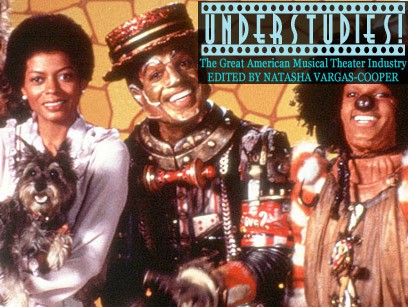
When the choir director, Mr. Swiggum, announced that the spring musical my senior year at Whitefish Bay High School would be The Wiz, it seemed an absurd choice. Our northern Milwaukee suburb was already colloquially known as “White Folks’ Bay,” and the preceding year had not done much to improve the community’s image in a city that studies have suggested is America’s most segregated.
In January of that year, a freshman student, the son of a prominent local attorney, got a ride home from practice from his basketball coach. Their car was stopped by Whitefish Bay police in front of the student’s house, and the coach was allegedly thrown to the ground and kicked-for no other reason, many of us at the high school assumed, than that he was black. A civil suit against the officers and the village was dismissed three years later, but whatever actually happened that day, the incident reinforced a broadly accepted notion that to be black in Whitefish Bay was, at best, unlikely, and potentially illegal.
The same winter, the school newspaper, the Tower Times-of which I was an editor, alongside future modesty advocate Wendy Shalit-ran an anonymous letter from a white student complaining about the school’s annual Black History assembly, describing it as exclusionary. Many of the school’s minority students-almost all of them bussed in from Milwaukee proper through the Chapter 220 program-protested. For the first time in recent memory, race was an issue everyone wanted to talk about, instead of an issue that everyone pretended not to think about. The series of consciousness-raising round-tables that followed didn’t really change anything, but were, needless to say, awfully formative for a suburban kid just beginning to embrace his liberal white guilt.
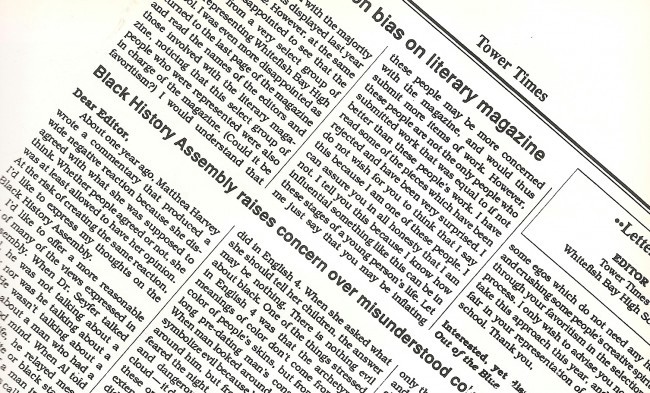
So: The Wiz. In a way, it was a canny move on Mr. Swiggum’s part-confronting our school’s lily-white image (and reality) head-on with a musical steeped in black culture. And, after the basically all-white spectacle of the previous year’s Fiddler, it wasn’t at all a bad idea to program a show that might get the school’s aspiring black performers to audition.
But at the time it seemed ridiculous, like the punchline to a joke about our school. (Setup: “What musical should never be put on at White Folks’ Bay?”) Obviously a whole bunch of the characters were going to be played by white kids. Would they embarrass themselves? Would they offend black students in the audience? Would any of the school’s black students even attend, or would they be so offended by the co-option of this show by the school’s dominant power structure that they’d, I don’t know, stage a boycott? Would the boycott get on the news? Would my college hear about it and call me on the phone and be like, “Oh, we didn’t know you went to a racist school, NEVER MIND”?
Whitefish Bay High School’s production of The Wiz was so rich with problematism as to be a Masters thesis, and so fraught with tuneful tension that it could be an episode of Glee. But all these issues were secondary to me, once rehearsals started. All I cared about was: How the fuck was I supposed to play this trumpet part?
Because I didn’t audition for The Wiz. While I was a theater nerd-my junior year I had played the lead in the centerpiece one-act of the school’s fall drama, a strident piece of anti-Gulf War 1 agitprop called Plays and Poems for Peace-I was not yet the enthusiastic karaoke-er I would become in adulthood, and was terrified of singing in front of people. So I played trumpet in the pit orchestra.
In fact, although I was second-chair trumpet in our school’s band, I played the lead trumpet parts for The Wiz, because our usual first-chair trumpet was busy playing the Cowardly Lion. And if you have never seen them before, the lead trumpet parts in The Wiz are hard.
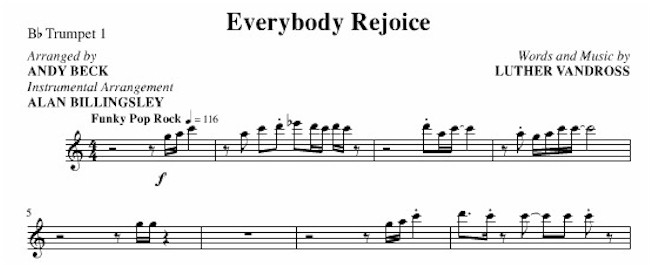
Like, for instance, there’s a fucking E♭ above high C up there in that first line. I was just recovering from three years of embouchure-wrecking braces, so high C was a stretch. I could squeak one out now and then, not with bravado, but tentatively, like a fart in Pre-Calc. E♭ above high C? No way.
And those rhythms! The brass parts were mostly funk blasts, fat off-beat accents of 16th and 32nd notes, the kind of playing that requires not just talent but big brass balls. The kind of playing where you’re resting for eight, 15, 23 measures, and then on the off-beat of the three you’re expected to nail a note you rarely hit before you got braces.
The pit orchestra’s first rehearsal, just two weeks before Opening Night, was a disaster. Despite Mr. Swiggum’s patient conducting and positive reinforcement, we couldn’t make it through a single song. As he energetically waved his baton for “Ease on Down the Road” or “Funky Monkeys,” player after player would drop out, our faces red with exertion, until we’d all clattered to an embarrassed halt. I remember that we never got past the first page of “Tornado Ballet,” an F5 disco that rocketed along so fast that by the time I realized I’d missed a cue I’d already missed the next one.
By the end of the night I couldn’t feel my lips and I had no idea what was happening to me. It seemed like a cruel joke-that Mr. Swiggum’s insane choice of The Wiz was stripping my trumpeting of any semblance of funk or swing it once had, exposing me in all my whiteness for the world to see. I was a guy who did fine when we played “Chorale and Shaker Dance.” There was no way I could handle this.
In truth, no high-school trumpeter-black or white, funky or unfunky-could play those parts. The parts were written for Broadway players, some of the best, most versatile musicians in the world. I was no more qualified to play those lines than my fellow trumpeter was to sing “Mean Ole Lion,” or than a high-school sophomore (or, really, Diana Ross) was to play Dorothy. It was Mr. Swiggum’s genius that he didn’t care-or at least that he withheld his winces well enough to fool us into thinking he didn’t mind. He just threw us in there and did his best to guide us through, on the grounds that we’d learn more from fucking up something amazing than we would from succeeding at something easy.
In the end, we managed to hold it together for our four performances in the high school auditorium.
Dorothy, the Scarecrow, and the Wizard were played by black students, one of whom would later dance with the Alvin Ailey company. My co-trumpeter, the Cowardly Lion, is now in grad school for set design at UW-Madison-where, coincidentally, Mr. Swiggum is finishing up a PhD in musicology. The witches, Glinda and Evillene, were played by pretty best friends whose good-girl/bad-girl personalities conformed precisely to the roles and who now both work in marketing. With few exceptions, I played the entire score pitched down an octave.
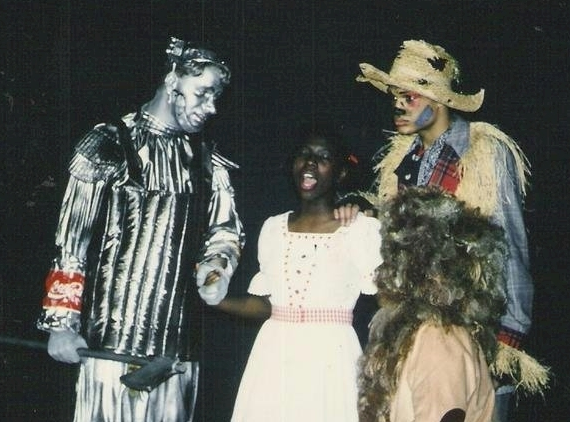
I only played the trumpet for two more years, and despite majoring in drama in college, have never been involved in another musical. (I got snobby about musicals, and by the time I wasn’t snobby about them anymore everyone else was much better at them than I was.) I haven’t been part of a real, scripted theatrical production (other than being the asshole who reviews it) since 2000, something that saddens me almost every day.
Eighteen years after The Wiz, the feeling of miserable failure that accompanied that first pit orchestra rehearsal is one I can call back to mind at any time. But so is the modest triumph we all felt when we finally made it through “Tornado Ballet” for the first time, during our final tech rehearsal. We didn’t crush it, we didn’t even play it particularly well, but the actors and the lights and the orchestra came together just enough to stagger to the end. Like the show itself, our run-through of “Tornado Ballet” healed no wounds and bridged no racial divide, but was not a horrible embarrassment. The silence afterward, in that auditorium empty of everyone but ourselves, was broken by the nervous laughter of a bunch of kids who couldn’t believe we just pulled that off.
Dan Kois did not care for The Revenge of Kitty Galore
.
Psychic Octopus Sells Out
“Paul the psychic octopus may have retired from predicting football matches, but his advertising career has just begun. The eight-legged oracle recently appeared in an advertisement for a German supermarket chain and has received more than 160 endorsement offers, including a book deal, according to the mollusk’s agent.”
–WHAT A FREAKING PHONY. I remember when it was all about forecasting which collection of athletes who were competing in a task that would be completely inexplicable to the octopus if he saw what they were doing, which he didn’t, by choosing the flag of one nation-another impossible concept for a cephalopod to comprehend-over another, man. You can’t trust anyone.
The Great San Francisco Craigslist Rent Grifter

“A San Francisco woman has been arrested and charged with bilking would-be apartment renters of thousands of dollars apiece by accepting their deposits and then spinning a tale that they couldn’t move in for a while because her mother had cancer, police said Thursday.” Notes one victim, Awl pal Mat Honan: “She has a tiny gray dog, I’m not sure of the breed, but it’s more than 20 years old and essentially lame. It was bleeding from the rectum when I last saw it. If you see her, please drop a dime. Side note: in the three bedroom apartment she showed us (where I now suspect she was a renter) she had one bedroom that was nothing but shoes. All the walls were lined with six foot high shoe racks, and completely full of designer shoes. So, you know, she may also answer to Imelda.”
My Men of Journolist: An Empty Inbox and a Broken Heart
by Anonymous

I was tempted by Andrew Breitbart’s offer of $100 grand for the full archives of Journolist-but I could never sacrifice the deep, sensual, never-ending love that Ezra Klein has given me year after year. The Daily Caller’s Mark Judge may not be impressed by my dating choices (“People have made cracks about the whiteness of the list, but the other lack of diversity is the total absence of hotness”). But the heart has reasons that reason knows not, Mark. And come on, you can’t NOT look into Chris Hayes’ baby blues and swoon.
When Ezra turned out the lights on Journolist, he turned out the lights in my heart.
You know how sometimes you think you have something good going with someone and then they just, to put it bluntly, stop returning phone calls/texts/run away when they see you on U Street? Well, with a private email list of this magnitude, loneliness evaporates. Doesn’t matter the time of day or night, ONE of them will be there, chatting away about war criminals, or GITMO, or how great Journolist itself is.
Since we live in an age of airing every little dirty secret, I’ll give you a few details-free of charge!
From: Matthew Yglesias
to: Journolist
date: Fri, Jan 15, 2010
subject: PPP and health costs
Can any of the economists on the list explain to me how Purchasing
Power Parity adjustment calculations are applied to health care? It
seems to me that it would be very difficult to get an apples-to-
applies comparison of what costs are.
Have you ever experienced just like, total, pure, unadulterated satisfaction? I have. Of course, the news wasn’t always good-there were hard times too.
From: Michael O’Hare
to: Journolist
date: Fri, Jan 15, 2010
subject: Not Manny!….
http://www.bizjournals.com/losangeles/stories/2009/05/04/daily27.html
Fifty games!
So Mark, I know what you mean when you say that looking at the men of Journolist, you realized “once and for all that Nietzsche was wrong.” The whole eternal return concept isn’t so awful when you have all of Journolist to relive, again and again.
When I told my mother about my love life, she was concerned, too. “Who will wed you now?” she’d ask. What she and Andrew Breitbart both don’t get is that Journolist is more than just a group of dudes emailing each other state secrets-it’s also a marriage. Deal with it, NOM.
So I’d like to offer a heartfelt thank you to iowntheworld.com for posting their Journolist Yearbook-now I’ll have something to always remember the best 400-odd one night stands of my life.
The anonymous author is currently shopping around for sexxy anonymous political listservs on which to lurk.
Understudies! Don’t Cry For My Dad, Argentina
by Claire Zulkey
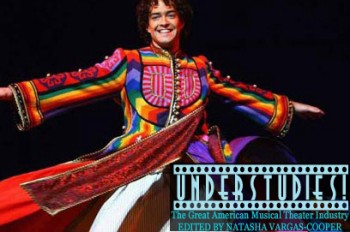
I’ll never forget the night my mom quit going to musicals: it felt like the first and only time she abandoned the family because, technically, she did. It was 1993 and as a very special treat, just before Christmas, my mom, dad, brother and I went to see Joseph and the Amazing Technicolor Dreamcoat starring Donny Osmond at the Chicago Theater. We’d have dinner, see the show and then spend the night downtown. Fancy!
I was psyched for Joseph: throughout my childhood my parents bought the soundtracks for us ahead of time so we knew the songs before we actually saw the show. Thus, we could look forward to hearing our favorites and thus extra-enjoy Cats, Les Miserables, Phantom and Chess. One of my favorite hobbies during those days was hiding out in my room and singing along to my favorite musicals (and perhaps choreographing my own dances to them as well) and Joseph was good for this, with lots of big, belty songs like “Joseph’s Coat” and a few I could sing very sincerely, like “Close Every Door.”
The funny thing is that I don’t remember too much about the production of Joseph itself because what happened that night overshadowed everything. I remember the production was big and colorful. I remember hearing my favorite songs. And then I remember my mom ditching us at intermission. There wasn’t much explanation: she basically said, “I can’t take this: I’m out of here,” and left.
This was unprecedented, which is why my dad didn’t really have an explanation that night as to why our mother suddenly abandoned us and drove all the way home to Evanston to spend the night by herself while the three of us slept at the Chicago Athletic Association. My parents had sat through a lot of crap in their careers as parents: my brother plunking out “Axel F” on the guitar during a school talent show, my lousy athletic career, Transformers (the animated version) in the theater and so on. It was bizarre to see her up and bail now.
When I ask my mom why she hated Joseph so much, to this day, she still can’t articulate it. Her rage overtakes her. I called her for purposes of fact-checking and her exact quote is, “Oh God! I hate that show. It’s just like…I don’t know…all ‘60’s.”
So there you go. For what it’s worth, Joseph doesn’t go down in history as one of my all-time favorites, not because of what my mom thinks, but because I don’t think it’s the kind of show people really identify with. What’s the song a girl sings to herself in her bedroom with her eyes closed? What’s the song that’s secretly about your life? What do you dance to? Why should we care about Joseph’s story now? Why does it need a narrator? Why is it a musical? And why is it “all ‘60’s” anyway?
After Joseph, mom and brother were done. Musicals were never really their thing: it was all my dad. My dad is totally gay for musicals, and Mom and Jack just went along with it. My dad’s the one who had a well-worn mixtape of “Great Girl Songs” (songs sung by Broadway female leads), who subscribed to satellite radio exclusively for the Broadway station, who sung “Don’t Cry for Me Argentina” in a falsetto in the kitchen until my mom threatened to divorce him.
Now that we’re all old, nobody except me wants to indulge my dad in his musical proclivities, and that works out just fine. Like most dads, mine is incredibly difficult to shop for come birthdays and holidays, so getting just two tickets to a show is a satisfying gift because I’m getting him something he wants and that nobody else will get him.
The first show we saw together was Wicked at the Oriental Theater, in 2007. I’d actually seen the show once before, with Ana Gasteyer in the role of Elphaba: Ana was fantastic, not just because she looked great in the green makeup and because she can really belt, but she’s a homegirl as well. We rapturously welcomed back the Northwestern alum. I had read the book before the musical came to be so I was a little skeptical that such a dark story could successfully be turned into a musical but I was pleasantly surprised: I liked most the sarcastic tunes like “Popular,” ones that made fun of either its characters or the whole concept of a musical itself.
I didn’t love Wicked so much that I adored it again on second viewing. It was fine, but unless you really love a musical, you don’t need to see it twice. It felt a little long. Kristy Cates was fine as Elphaba but we were missing that thrill of “Hey it’s that lady from SNL!” But I don’t regret going to see it twice because as the final note of “Defying Gravity” was still ringing out in the theater before intermission, I looked over at my dad and he was crying. Dropping me off at my apartment building after our date, he teared up again, mostly because he loved getting to see a big musical but also because of the quality time. My dad is a Grade-A softy, which I know will surprise you, given his love of musicals.
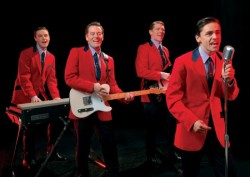
The next show we saw was Jersey Boys at the Bank of America Theater, at my dad’s request. The show’s producers had done an excellent job on a saturation campaign and my dad had fallen prey, claiming to hear wonderful things about the show’s story, not to mention the tunes. Even though it’d be my first time seeing this show, I was less excited than I was for Wicked. I viewed jukebox musicals with suspicion: Movin’ Out had been making the rounds and I cringed at the thought of Billy Joel songs, which lacked a certain street cred, getting made into a musical, which is similarly short of a certain amount of coolness. I would like to take this opportunity however to note that I came up with the idea for Movin’ Out in college before the musical even came to exist, and I have the journal to prove it, where I noted, whilst bored in Criminology class, that Billy Joel’s songs would make a great musical, if only they made musicals out of already-written songs.
Anyway, I wasn’t excited for Jersey Boys partially because a musical full of Four Seasons tunes didn’t entice me: growing up listening to the oldies station in the car, I came to hate Frankie Valli’s voice and regarded it as an irritating curiosity. I also wasn’t particularly intrigued by the story of how the band came to be. So it’s a guy’s musical, eh? How tough can a band be when its lead singer sounds like that?
My dad thought the music and singing in Jersey Boys was great but, in a grand Zulkey tradition, didn’t think it lived up to the hype (and didn’t think it was as good as Wicked.) But I have to admit, I liked Jersey Boys way more than I thought I would and I’ll defend it to this day. I did think that its attempts to be “rough” sometimes felt a little ham-fisted, like its writers thought “We should put a swear word in here!”. Additionally, the use of the screen and stage didn’t totally seem to mesh, but the story turned out to be interesting enough and I have to admit, I came to appreciate the band’s catalogue. I perhaps never grasped just how many hits the band turned out and for how long, nor that the guy behind the songs also wrote “Short Shorts.”
I also have to confess here that I totally had a crush on the actor who played said songwriter Bob Gaudio. He was all tall and cute and was a good dancer (Jersey Boys is good if you like seeing white boys dancing in a Motown style, which I do). It’s specifically due to Jersey Boys that I like the song “Beggin” by Madcon.
Now my dad and I are in need of some new musicals to check out. The last one we saw was Million Dollar Quartet and after that we’ve had a hard time finding one we agree on. I wouldn’t mind seeing Spring Awakening but my dad isn’t too keen on a musical about “teenagers who are discovering the tumult of sexuality.” Nobody is super interested in musicals based on movies that they didn’t adore so Shrek and Billy Elliott are out. I reserve the right not to see nudity while seated next to my father so no Hair. either (I’m sure my mom would love it, though). I hope some new shows come to Chicago that we can agree on though because I love watching my Dad cry and, to a lesser extent, hearing him sing in a super-high girly voice on the way home.
Claire Zulkey lives in Chicago. You can learn so much more about her here.
